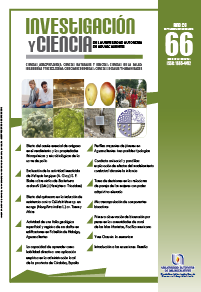Efecto del quitosano en la inducción de resistencia contra Colletotrichum sp. en mango (Mangifera indica L.) cv. Tommy Atkins
DOI:
https://doi.org/10.33064/iycuaa2015663565Palabras clave:
mango, quitosano, inducción de resistencia, peroxidasa, Colletotrichum spResumen
El mango es susceptible a una enfermedad postcosecha denominada antracnosis, causada por el patógeno Colletotrichum sp. Los fungicidas han sido utilizados para controlar las enfermedades ocasionadas por hongos; sin embargo, ocasionan daño al medio ambiente. El quitosano posee propiedades antimicrobianas e induce resistencia en las plantas, en esta resaltan algunas enzimas,
como la peroxidasa (POD). El objetivo de esta investigación fue evaluar el efecto del quitosano en la inducción de resistencia contra Colletotrichum sp. en frutos de mango. A nivel in vitro el quitosano inhibió la germinación de esporas, la elongación del tubo germinativo y el crecimiento micelial de Colletotrichum sp. Para los tratamientos aplicados a los frutos en postcosecha, el quitosano a concentraciones de 1.0 y 1.5% inhibió por completo a Colletotrichum sp.
Descargas
Métricas
Citas
• ARAUZ, L. F. Mango anthracnose: Economic impact and current options for integrated management. Plant Disease, 84(6): 600‐611, 2000.
• BARNET, H., y HUNTER, B. Illustrated genera of imperfect fungi. New York: MacMillan Publishing Co., 200-201, 1998.
• BAUTISTA BAÑOS S. et al. Effects of chitosan and plant extracts on growth of Colletotrichum gloeosporioides, anthracnose levels and quality of papaya fruit. Crop protection, 22(9): 1087-1092, 2003.
• BENHAMOU, N. et al. Induction of systemic resistance to Fusarium crown and root rot in tomato plants by seed treatment with chitosan. Phytopathology, 84, 1432–1444, 1994.
• BEN-SHALOM, N. et al. Controlling gray mould caused by Botrytis cinerea in cucumber plants by means of chitosan. Crop Protection, 22(2): 285-290, 2003.
• BHASKARA, R. M. et al. Effect of pre-harvest chitosan sprays on post-harvest infection by Botrytis cinerea and quality of strawberry fruit. Postharvest Biology and Technology, 20(1):, 39-51, 2000.
• BRADFORD, M. A rapid and sensitive method for the quantitation of microgram quantities of protein utilizing the principle of protein-dye binding. Analytical Biochemistry, 72(1-2): 248-254, 1976.
• CHEN, C. et al. Defense enzymes induced in cucumber roots by treatment with plant growth-promoting rhizobacteria (PGPR) and Pythium aphanidermatum. Physiology and Molecular Plant Pathology, 56(1): 13-23, 2000.
• EL GHAOUTH, A. et al. Antifungal activity of chitosan on two postharvest pathogens of strawberry fruits. Phytopathology, 82, 398-402, 1992.
• EL GHAOUTH, J. et al. Chitosan coating effect on storability and quality of fresh strawberries. Journal of Food Science, 56(6): 1618-1620, 1991.
LITERATURA CITADA
• EL HADRAMI, A. et al. Chitosan in Plant Protection. Marine Drugs, 8(4): 968-987, 2010.
• KOLATTUKUDY, P. E. et al. Plant peroxidase gene expression and function. Biochemical Society Transactions, 20(2): 333-337, 1992.
• LIU, J. et al. Effects of chitosan on control of postharvest diseases and physiological responses of tomato fruit. Postharvest Biology
and Technology, 44(3): 300-306, 2007.
• LIN, J. et al. Expression of PPO and POD genes and contents of polyphenolic compounds in harvested mango fruits in relation to Benzothiadiazole-induced defense against anthracnose. Scientia Horticulturae, 130(1): 85-89, 2011
• LÓPEZ GÓMEZ, R. y GÓMEZ LIM, M. A. A method for extracting intact RNA from fruits rich in polysaccharides using ripe mango mesocarp. Horticultural Science, 27(5): 440-442, 1992.
• LÓPEZ MORA, L. I. et al. Evaluación de la actividad antifúngica del quitosano en Alternaria alternata y en la calidad del mango ‘Tommy Atkins’ durante el almacenamiento. Revista Chapingo Serie Horticultura, 19(3): 315-331, 2013.
• MOHAMMADI, M. y KAZEMI, H. Changes in peroxidase and polyphenol oxidase activities in susceptible and resistant wheat heads inoculated with Fusarum graminearum and induced resistance. Plant Science, 162(4): 491-498, 2002.
• TERRY, L. A. y JOYCE, D. C. Elicitors of induced disease resistance in postharvest horticultural crops: a brief review. Postharvest Biology and Technology, 32(1): 1-13, 2004.
• TIAN, S. et al. Induction of defense responses against Alternaria rot by different elicitors in harvested pear fruit. Applied Microbiology and Biotechnology, 70(6): 729-734, 2006.
• ZHU, S. J. y MA, B. C. Benzothiadiazole or methyl jasmonateinduced resistance to Colletotrichum musae in harvested banana fruit is related to elevated defense enzyme activities. Journal Horticultural Science and Biotechnology, 82(4): 500-506, 2007.
Descargas
Publicado
Cómo citar
Licencia
Derechos de autor 2015 Guillermo Berumen Varela, Leonardo Daniel Coronado Partida, Verónica Alhelí Ochoa Jiménez, Martina Alejandra Chacón López, Porfirio Gutiérrez Martínez

Esta obra está bajo una licencia internacional Creative Commons Atribución-NoComercial-CompartirIgual 4.0.
Las obras publicadas en versión electrónica de la revista están bajo la licencia Creative Commons Atribución-NoComercial-CompartirIgual 4.0 Internacional (CC BY-NC-SA 4.0)









